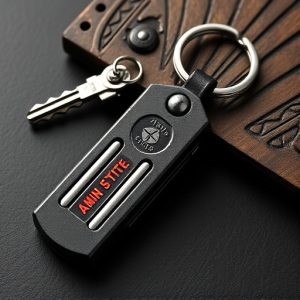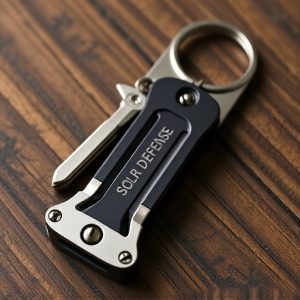Self-Defense Keychains for Runners: Legal Requirements & Safety Guidelines
For runners prioritizing safety, self-defense keychains are a compact solution but come with varying…….
For runners prioritizing safety, self-defense keychains are a compact solution but come with varying legality across regions. Before purchasing, thoroughly research local laws on reasonable force and carrying restrictions to avoid legal issues and maintain peace of mind while running. Each jurisdiction has unique guidelines, so understanding your state's or country's regulations is crucial for safe and compliant use of these devices. Key factors include design, durability, and legal compliance, ensuring a reliable mechanism that adheres to local laws governing self-defense keychains for runners.
“In today’s world, safety is paramount, especially for runners who often face unpredictable situations while on their routes. This article explores the legal landscape surrounding self-defense keychains designed specifically for runners. We’ll navigate local regulations, state laws, and international standards to ensure you’re informed about the legal requirements when carrying a self-defense keychain for personal protection during your runs. Understanding these guidelines is crucial for runners seeking peace of mind.”
- Understanding Self-Defense Keychains for Runners: A Legal Perspective
- Local Regulations and Restrictions on Personal Defense Devices
- Compliance with State Laws: What You Need to Know
- International Legal Considerations for Running Safety Tools
- Ensuring Safe Use: Guidelines for Runner's Self-Defense Keychains
Understanding Self-Defense Keychains for Runners: A Legal Perspective
For runners, self-defense keychains offer a compact and readily available means of personal safety while on their daily jogs or during early morning runs in less-populated areas. These keychains are designed to provide individuals with a quick and effective defense mechanism against potential threats, be it an unexpected attack or the need to deter a harasser. From a legal perspective, the availability and use of self-defense keychains for runners are subject to regional regulations that vary widely. Some jurisdictions allow their citizens to carry self-defense tools like pepper spray and stun guns, while others have more stringent laws restricting the types and quantities of force individuals can employ for self-defense.
Before investing in a self-defense keychain for running, it’s crucial to understand the legal implications in your area. This includes knowing what constitutes reasonable force in self-defense, as well as any restrictions on carrying or using such devices. Staying informed about local laws ensures that runners can exercise their right to personal safety while adhering to the law, thus avoiding potential legal consequences and ensuring their peace of mind during their runs.
Local Regulations and Restrictions on Personal Defense Devices
In many regions, personal defense devices, including self-defense keychains designed for runners, are subject to local regulations and restrictions. Before carrying such a device for safety purposes, it’s crucial to understand and comply with these laws to avoid legal repercussions. Each jurisdiction has its own set of guidelines regarding what constitutes an acceptable personal defense tool, its usage, and the circumstances under which it can be legally carried.
For instance, some areas may require permits or licenses for certain types of self-defense devices, while others might have restrictions on the level of force they can employ. Local laws often differentiate between non-lethal self-defense tools, like keychains with pepper spray or tasers, and lethal weapons. Runners considering a self-defense keychain should research their area’s specific regulations to ensure they remain within legal boundaries, thereby enhancing personal safety without inviting legal troubles.
Compliance with State Laws: What You Need to Know
When considering a self-defense keychain for runners or any personal safety device, it’s crucial to understand the legal landscape within your state. Each US state has its own set of laws regarding self-defense and the use of force, which can significantly impact the legality of carrying a keychain with defensive capabilities. For instance, some states have ‘stand-your-ground’ laws that allow individuals to defend themselves without the duty to retreat, while others may have stricter requirements for using force during a crime.
As a responsible runner or outdoor enthusiast, familiarizing yourself with these state laws is essential before investing in a self-defense keychain. Ensure that the use of such devices complies with local regulations to avoid any potential legal issues. Remember, the last thing you want is to find yourself on the wrong side of the law during an emergency situation.
International Legal Considerations for Running Safety Tools
When considering the integration of a self-defense keychain for runners, it’s crucial to explore international legal frameworks that govern such safety tools. With increasing awareness about personal security, many countries have implemented regulations to ensure the legality and functionality of self-defense devices. These laws vary significantly from nation to nation, reflecting diverse cultural perspectives on individual protection. For instance, some jurisdictions mandate specific criteria for self-defense weapons, including lock mechanisms, size restrictions, and allowed chemicals or materials.
Understanding these legal nuances is paramount for runners aiming to stay safe during their journeys. The European Union, for example, has standardized regulations that categorize self-defense tools based on their potential danger. Devices classified as low risk may be readily available, while those deemed higher risk require special permits. In contrast, countries like the United States offer more flexible laws, allowing a broader range of self-defense options but with varying restrictions at the state level. For runners planning international travel or living in diverse legal landscapes, researching local regulations is essential to ensure compliance and peace of mind when carrying a self-defense keychain for runners.
Ensuring Safe Use: Guidelines for Runner's Self-Defense Keychains
Ensuring Safe Use: Guidelines for Runner’s Self-Defense Keychains
When considering a self-defense keychain for runners, it’s crucial to prioritize safety and effectiveness. These small yet powerful tools should not only deter potential attackers but also be user-friendly, especially during physical activities like running. Look for keychains designed with a simple, reliable mechanism that allows for quick deployment when needed, ensuring your hands remain free for self-defense or escape maneuvers.
The ideal runner’s self-defense keychain should also meet specific safety standards to guarantee its integrity under pressure. Check for certifications and reviews that attest to the product’s durability and reliability. Additionally, familiarize yourself with local laws regarding self-defense devices, as regulations vary worldwide. Knowing your rights and responsibilities will ensure you’re fully prepared while adhering to legal boundaries.
When equipped with knowledge of local, state, and international laws, runners can make informed decisions about integrating a self-defense keychain into their safety arsenal. Understanding legal requirements is essential to ensure these devices are used responsibly while offering added peace of mind during outdoor runs. Remember, the ultimate goal is to promote running safety without causing unnecessary alarm or infringing on legal boundaries. By staying compliant, runners can effectively protect themselves and contribute to a safer overall experience in their communities.


